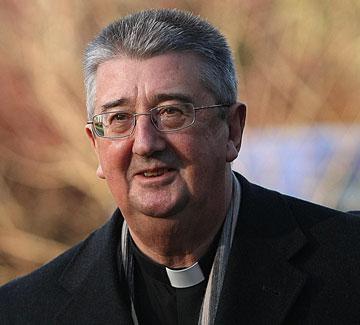|
Archbishop Martin says church needs to deal better with the 'gray areas' of pastoral life
John Thavis
Archbishop Diarmuid Martin of Dublin had some interesting things to say at today’s press briefing for the Synod of Bishops on the family. Archbishop Martin was present at the 1980 synod on the family (and at synods after that), and he reflected on what has changed – notably, the very open debate at this session, and the willingness to look at new approaches. “On some of the subjects, the theological debate has been going on for years, and I don't expect this synod is going to bring that to a conclusion. But this synod cannot simply repeat what was said twenty years ago. It has to find new language, to show that there can be development of doctrine, and that there has been a willingness to listen to what emerged in the questionnaires that went out and what emerged in the synod itself,” he said. Archbishop Martin said that in general, there’s a movement away from seeing the church’s teaching on marriage as something that is “taught” to people, and a better understanding that the church itself learns through the experience of the sacramental marriages of its faithful. Catechesis is essential, he said, but the church also has to recognize that while many couples could not explain the theology of marriage and the family, they “understand it, and live it.” The synod heard a lot about truth and mercy, and Martin said it was important to find real ways of bringing the two together. Because of the strong canonical tradition in the Catholic Church, he said, “we’re not good at dealing with exceptions.” He said we have both “rigorism” and “laxism” in the church, but “most people fall in the gray areas between those two, and we have to exercise our pastoral responsibilities in the gray areas, not falling into either extreme.” Martin also explained a crucial procedural difference in this synod: The small-group discussions next week will not be bringing forward “propositions” to fold into a final document. Instead, they will be fine-tuning the relatio, to be presented Monday, that sums up the discussion so far. What the bishops send to the pope at the end of next week will be in effect a “working document” for the next phases of the synod: a year-long period of reflection and discussion, followed by another assembly in Rome in October 2015. As a side note, Valerie Duval-Poujol, who represented the World Baptist Alliance at the synod, offered evidence that the “Francis factor” was alive and well among the non-Catholic attendees and the lay auditors invited to the synod: One couple invited the pope to attend the wedding of their child, and another told him their children say the pope is “really cool.”
|
.
Any original material on these pages is copyright © BishopAccountability.org 2004. Reproduce freely with attribution.
